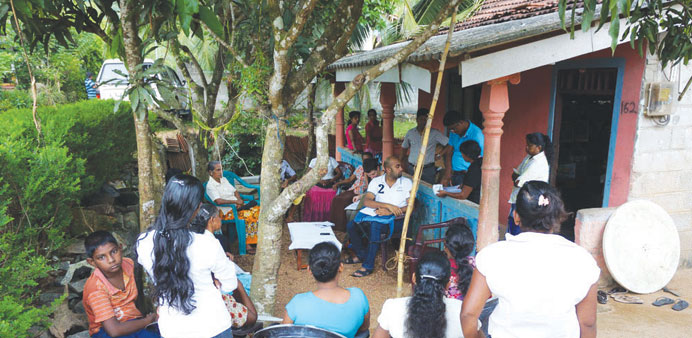HELVETAS Swiss Intercooperation, one of the largest Swiss-based NGO, is making use of the curriculum developed by Georgetown University in Qatar (GU-Q) to train pre-migrants and migrant families left behind.
Three years ago, six Georgetown students teamed up with a professor to design a financial literacy curriculum for migrant workers as part of the Undergraduate Research Experience Programme (UREP).
“This is one of the most practical and field-oriented training modules on financial literacy I have seen,” said Katrin Rosenberg, project manager at HELVETAS Swiss Intercooperation in Sri Lanka. “This module, together with other modules, will serve as a basis for the development of our specific training tool on budgeting and saving.”
Rosenberg expects that the curriculum can also be adapted for use and contribute to the creation of training material for use with migrants from Nepal.
The UREP project, awarded in 2010 by the Qatar National Research Fund (QNRF), found that migrant workers can learn to save more money after attending a short financial literacy workshop. The study focused on married, male Indian migrant workers in Qatar, and their wives who remained back in India.
Assistant Professor Ganesh Seshan was the GU-Q faculty mentor for the six students who worked together to implement a control trial of the migrant workers. The UREP team randomly assigned migrant study participants to either a treatment group that had the choice of attending a financial literacy workshop, or to a control group that was not invited to attend.
The UREP team students, Eilin Francis, Aakash Jayaprakash, Aminah Kandar, Jibin Koshy, Marlene Nang, and Qazi Rashid, provided research assistance that led to the decisive conclusions. Georgetown alumnus, Karthik Gopalan, now studying at Columbia, worked on the curriculum’s first draft in an earlier UREP project that inspired the recent study’s focus on financial literacy.
Committed to making migration safer for workers, HELVETAS Swiss Intercooperation is a non-profit organisation that promotes self-reliant and sustainable development in 30 countries across Africa, Asia, and Latin America. It has been active in Sri Lanka for over 30 years.

